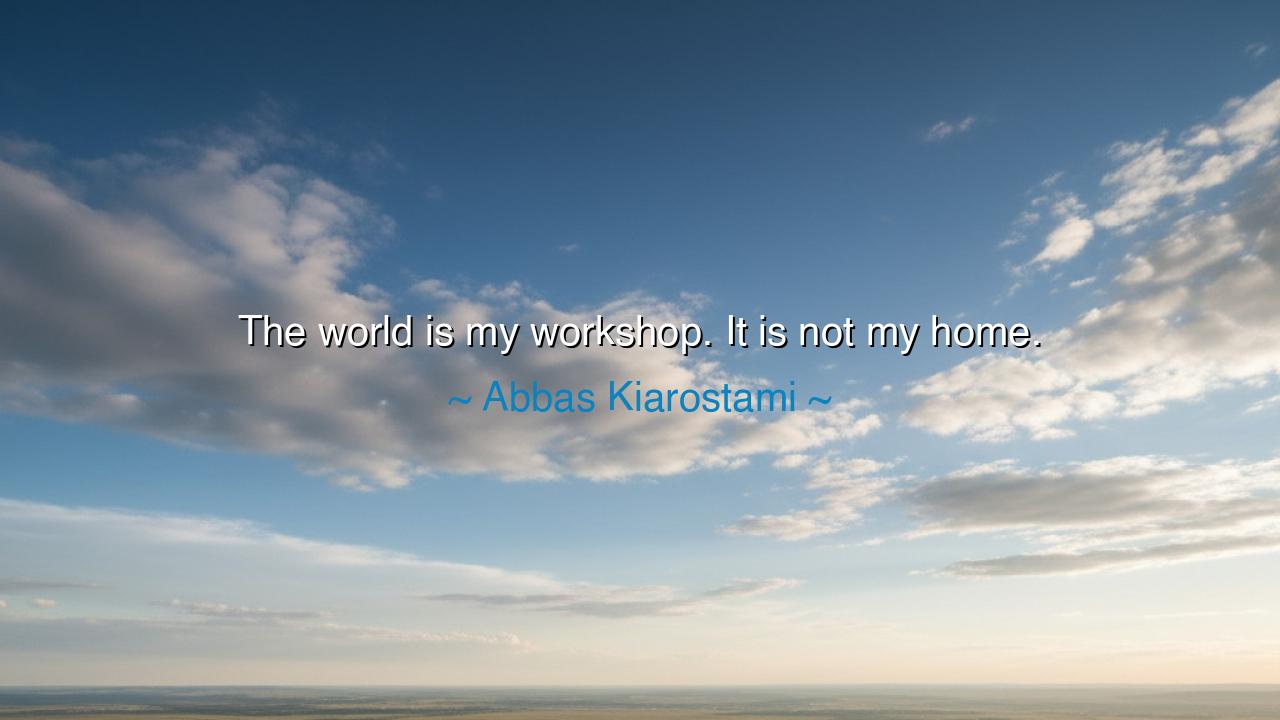
The world is my workshop. It is not my home.






“The world is my workshop. It is not my home.” Thus spoke Abbas Kiarostami, the Iranian poet and filmmaker, whose art shimmered like light upon water — quiet, profound, and filled with unspoken truths. In this single sentence, he reveals not merely an artist’s creed, but a vision of life itself. For to call the world one’s workshop is to see it as a place of labor, discovery, and creation — a realm where one is meant to learn, to shape, and to serve. Yet to say it is not one’s home is to remember that this life, however beautiful, is fleeting; that we are travelers upon the earth, not owners of it. In these few words, Kiarostami reminds us of the delicate balance between engagement and detachment, between the call to create and the wisdom to let go.
The origin of this quote lies in Kiarostami’s artistic philosophy — a philosophy woven from humility and vision. A man of cinema, he refused to see himself as a master of the world he depicted. Instead, he saw himself as its observer, its servant. His films — Taste of Cherry, Close-Up, The Wind Will Carry Us — were meditations on impermanence and meaning, shaped by silence as much as by speech. Kiarostami often said that the artist’s task was not to explain life, but to listen to it. To him, the world was a great field of lessons — a workshop where the spirit is refined, where every encounter, every image, and every sorrow is a tool for understanding. Yet he also knew that one must not cling too tightly to this field. To confuse the workshop for the home is to mistake labor for rest, to believe the material world can offer what only the spirit can fulfill.
To call the world a workshop is to honor its challenges. The craftsman does not enter his workshop seeking comfort — he enters to struggle, to sweat, to learn through imperfection. Likewise, life is not given to us as a paradise, but as a place of transformation. The sculptor shapes stone; the soul shapes experience. Every hardship, every joy, every failure is a chisel in the hands of time, carving the rough marble of the self into form. The wise understand that this labor is sacred, for through it the soul discovers its purpose. But the wise also know this: the workshop is not the home. The work must be done, but the worker must one day depart.
The ancients knew this truth well. The Stoics taught that we are citizens of two realms — the earthly and the eternal. They advised living fully in the world, yet without becoming bound to it. The Buddha, too, spoke of life as a path of practice — a training ground for compassion and awareness. Even the Christian mystics called this earth “a vale of soul-making.” In every tradition, the same wisdom resounds: the world is where the soul learns, not where it rests. Kiarostami, though a man of modern art, spoke with that same timeless voice. His words carry the echo of those sages — that our task is not to escape the world, nor to be consumed by it, but to work within it as students of truth, knowing that the true home lies beyond.
Consider the life of Leonardo da Vinci, who, like Kiarostami, saw the world as both canvas and classroom. Leonardo studied clouds, bodies, light, and motion — not to possess them, but to understand the laws behind them. He once said, “While I thought I was learning to live, I was learning to die.” He knew that the world is a temporary school, where genius and humility must walk hand in hand. He labored tirelessly — dissecting corpses, sketching inventions, painting souls — yet he never called himself its master. In the end, he died with countless works unfinished, as if to remind us that no matter how vast our creation, the workshop is never complete, and it was never meant to be.
Kiarostami’s words are not of sorrow, but of clarity. To remember that the world is not our home is not to despise it, but to see it clearly for what it is — a place of fleeting beauty, a classroom of impermanent moments. The danger lies in mistaking its temporary brilliance for eternity. When we cling to possessions, fame, or even life itself as if they were our home, we become enslaved by them. But when we see them as tools of growth, as fleeting gifts meant to be used with care and gratitude, we are freed. To live this way is to carry both reverence and detachment — to work with passion, but to hold nothing too tightly.
The lesson, then, is both humble and profound: live as a craftsman, not a consumer; as a pilgrim, not a settler. Let every day be your workshop, every act a chance to refine your spirit. Work in the world with love — build, create, teach, nurture — but remember that none of this is yours to keep. The world is a stage for the soul’s apprenticeship, not its throne. Cherish it, but do not chain yourself to it.
So, as Abbas Kiarostami reminds us, the world is our workshop, not our home. It is the forge in which we shape our souls, the journey through which we discover the divine within and beyond ourselves. And when the day comes to set down the tools — when the final light fades and the workshop grows still — we will depart not in despair, but in quiet triumph, knowing that the work was done with purpose, and that the true home, unseen yet certain, awaits us beyond the dust and beauty of this world.






AAdministratorAdministrator
Welcome, honored guests. Please leave a comment, we will respond soon